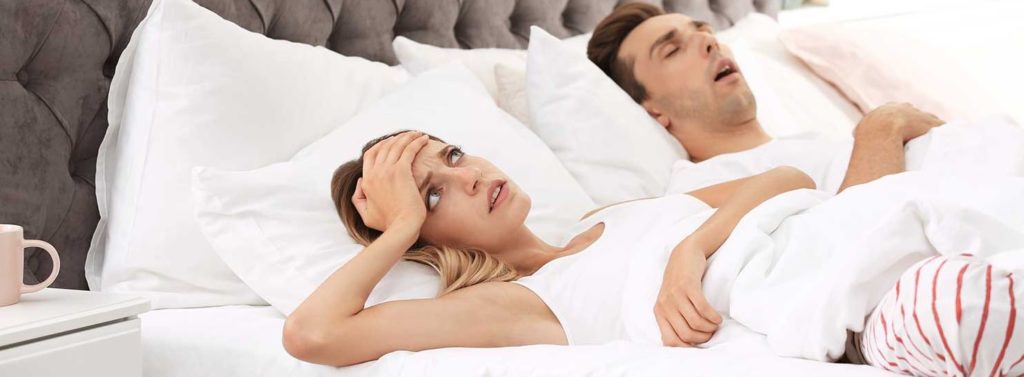
Have you ever nudged your partner in bed because they were snoring up a storm? Turns out, loud snoring could be a sign of sleep apnea – a very common problem in American adults. In fact, millions of Americans deal with snoring while sleeping. Of course, not all snorers have sleep apnea, but it’s also a great warning sign to get checked out.
Learn more about Snoring from The Mayo Clinic
Is it Sleep Apnea or Just Snoring?
It helps to do your research and know the difference between normal snoring and sleep apnea snoring.
Regular Snoring
Snoring happens because the tissues in the throat relax and partially block the airway. Then the tissues vibrate, causing the snoring sound we all know. Your anatomy and lifestyle factors, like alcohol consumption and weight, can determine the way you snore.
Related Article: Snoring, Sleeping Disorders, and Sleep Apnea
Sleep Apnea Snoring
Often, frequent and loud snoring is a major indicator of sleep apnea. When you experience sleep apnea snoring, your body takes multiple breathing pauses or shallow breaths during sleep. If someone with sleep apnea falls asleep, they could experience breathing pauses up to 10 seconds or even up to a minute. Obesity, large tonsils, or large tongues can also be contributing causes of sleep apnea.
Sleep Apnea Symptoms
You can also look for other signs and symptoms of sleep apnea that include:
- Morning headaches
- Excessive daytime sleepiness
- Sore throat when wakening
- Restless sleep
- Choking or gasping at night
- Chest pain at night
- High blood pressure
- Disruptive snoring
- Poor attention span
Sleep Apnea Treatments can Protect Your Health
It’s so important to talk with your dentist and your doctor to determine treatment for sleep apnea and sleep apnea snoring. Sleep apnea treatments range from oral appliances, nasal strips, breathing machines, and even surgery, and it’s important not to underestimate the risks of leaving sleep apnea untreated. Many health complications, such as high blood pressure, stroke, diabetes, and more, can arise due to sleep apnea. Talk to Dr. Skrobanek and the GPS Dental team about treatment options for sleep apnea and sleep apnea snoring. Ask if oral appliance therapy might be the right solution for you.
GPS Dental Can Help
Research shows that oral appliance therapy, or wearing a mouth guard while you sleep, is an effective treatment option for sleep apnea snoring. More than 100 oral appliances have received FDA clearance and Dr. Skrobanek will recommend the device that is best for you. Oral appliance therapy is also covered by many medical insurance plans.
Related Article:
- It’s More than Snoring: Sleep Apnea can Compromise Your Health
- Mouthguards Protect Your Smile (they aren’t just for athletes!)
GPS Dental can Protect Your Smile
Now you know more about how mouthguards protect your smile and your health! It’s also important to stay up to date on your cleanings and routine visits with Dr. Skrobanek. In the meantime, having a strong and steady oral health routine – brushing twice a day and flossing once – is the best thing you can do for your oral health!
Don’t let Sleep Apnea compromise your health, call us today to schedule your consultation with Dr. Skrobanek at 210-633-3477.
Dr. Gary P. Skrobanek and his experienced, friendly team at GPS Dental offer affordable family dentistry and gentle dental care in the San Antonio, TX area. Our Brooks City Base dentist office is conveniently located and offers early morning appointment times Monday through Friday to meet your needs. At GPS Dental, we provide most dental services, from family and general dentistry to dental implants, sleep apnea, TMJ / TMD Treatment, cosmetic dentistry and much more. We accept most dental insurance plans and offer affordable financial solutions for any budget. Call us at (210) 633-3477 to make an appointment.







